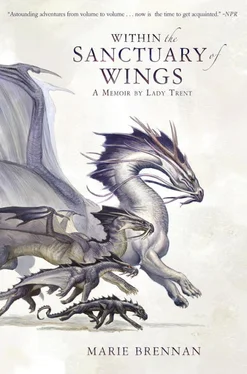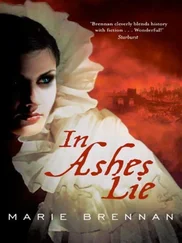“That may be the most absurd question anyone has ever asked me,” I said. In Akhian, which meant she understood very little of it; but my tone was clear enough.
I was dressed in clothing we had made during the winter—for you must not imagine my mountaineering garb would have survived a whole season’s wear without suffering quite a bit, and I would need it when I left the Sanctuary. We had debated the merits of dressing me in my own clothing for this occasion, but ultimately Kahhe’s argument had prevailed, that I would be less intimidating if clad in the familiar furs and yak wool of their own people. My body was sweltering inside the layers, for it was warm inside the house, but my hands and feet were cold with apprehension.
Zam had brought the word just a little while before: the council of elders was in Imsali. Ruzt had gone to speak with the temple caretakers more than a week ago, begging the council’s presence today; the message was given to them when they woke, and it seemed they had complied. Nine elderly female Draconeans waited for me outside, all without knowing what they waited for.
Nine elderly female Draconeans—and the entire population of Imsali, who must be wondering what the sisters were up to.
I forced my thoughts into the Draconean tongue. “Waiting will not make me more ready.”
Ruzt nodded. I found myself noting her posture and body language, filing it away under “nervousness, Draconean, signs of.” Such things are soothing to me, at moments like that.
Ruzt opened the door and led me outside.
Sunlight and cold air came in from the exterior door. Through the gap I could see a crowd of Draconeans, tall and small, waiting. One of them—a juvenile, judging by size—spotted me as I passed through the darkness of the antechamber, and tapped at an adult’s thigh in an unmistakable gesture. Though I could not hear the words through the roaring in my ears, I knew what they must be: “Mama, what’s that?” Or at least the Draconean equivalent.
I stepped into view, and the world went silent.
My imagination supplied a thousand Draconeans. In truth, there were less than a hundred. But when every last eye is upon you, the number seems far greater; and then, like a blow, I heard someone hiss a recognizable Draconean word: “ Human. ”
Silence broke, and pandemonium reigned.
* * *
The sisters bracketed me in a triangle. They had anticipated the rush of bodies that would occur, as the more energetic and warlike of their kin leapt to defend the council from my small, winter-starved self. Zam, who had once seized me and thrown me across the temple, bodily checked another Draconean who seemed bent on doing the same. Ruzt was shouting, her wings furled and her hands raised high. Kahhe stood ready to hurl me back through the doorway if necessary, where they could more easily guard me against attack.
But it was not necessary. One of the elders snapped her wings open, then another; the rest followed suit in short order. As if that were a gavel pounded upon a judge’s bench, the crowd fell into a muttering hush, and then quiet. A crisp order from one of the elders sent the various Draconeans back to their places, restoring the empty space that had surrounded my entrance.
I judged this the right time to speak. I had no wings to wrap around my body, but I performed the human approximation, laying both my hands atop my breast in the Draconean gesture of respect. Raising my voice, I spoke the words I had painstakingly rehearsed with the sisters. Only a faint tremor marred them.
“May the sun bless you and keep you warm. My name is Isabella, and I mean you no harm. I owe my life to these three sisters, who rescued me from certain death in the mountains. If it meets with the approval of you nine, the revered elders of the Sanctuary, I would like to repay their generosity and kindness by assisting your people in any way I can.”
My listeners could not have been more astonished had one of their yaks reared up on its hind legs and begun speaking. The only sounds were the constant rush of the wind and the dripping of icicles melting off the eaves. Then one of the elders said, stammering, “H-how does she know our language?”
I was in trickier waters now. My first speech was rehearsed to be fluid and well pronounced, but from here on out I must rely on my ability to comprehend and speak at speed. Since I was still more conversant with the older, religious form of the language than the one spoken in daily life, the potential for error was quite large. But just as my growing skill had caused me to see the sisters as people rather than creatures, so must I use conversation to prove to these elders that I, too, was a person.
My reply came more slowly than my initial greeting. “I have been studying all winter to learn it. There is a human language that is a little bit the same. My knowledge of that language helps.”
“You taught that thing?” one of the elders snapped at the sisters.
“If I had not learned,” I said before Ruzt could reply, “I would not be able to thank you now.” It came out more heavily accented than I would have liked, and more than a little tinged with Akhian elements. I still defaulted to these when my attention slipped. But I made myself understood, and that was enough.
One of the elders strode forward. Ruzt let her pass, so I stood my ground. This, too, we had expected and prepared for: the elder took me by the chin and tilted my head upward, so she could study my face more closely. To maintain direct eye contact would have been a challenge; to drop my gaze entirely would have made me look weak and vulnerable. Instead I fixed my gaze upon her muzzle, making no attempt to resist.
She turned my head this way and that, pulling off my hat to finger my hair, which must have been very strange to her. I was abruptly conscious of its ragged, matted state, and the smell it must have carried. (I had washed it a handful of times during the winter, but under the circumstances, a wet head was less than wise.) When she attempted to peel back my lips, however, I pulled away. “If you want to see my teeth,” I said, politely but firmly, “then ask.”
I could see that my response amused her. This, however, did not prevent her from turning a gimlet eye on Ruzt and the other two. “You know you have broken a law.”
All three sisters brought their wings forward, around their bodies. Ruzt said, “We know. We would not do so without good reason.”
“And what is your reason?” This came from one of the other elders, the one I suspected to be the oldest of them all. Draconeans show few signs of aging compared with the grey hair and wrinkled skin of humans, but her eyes were sunken and her bone structure more pronounced, and her movements were slow and cautious.
My command of the language did not suffice to let me follow Ruzt’s reply in its entirety, but its content was familiar to me. These Draconeans knew themselves to be confined to the Sanctuary, with no place more remote and protected to which they might flee; now she told them they were likely the last of their kind. Contact with humans, she warned them, was inevitable. They could wait for it to happen on our terms—by which I mean those of my species—or take the first steps themselves, in a fashion they might hope to control. And the first step was to acquire a single human, to see whether she could be reasoned with.
“But why did you hide her?” another elder asked. The one who had examined me was among her peers once more, watching this all with a thoughtful eye. “Why not inform us at once?”
“We thought she was going to die,” Zam said. The bluntness of it shook me, even though the danger was by then long past—the danger of dying from my ordeal in the mountains, at least. My current peril was still an open question. Ruzt had promised to do her best to help me escape if the situation turned against me, but her best was likely to amount to a temporary stay of execution at most.
Читать дальше












